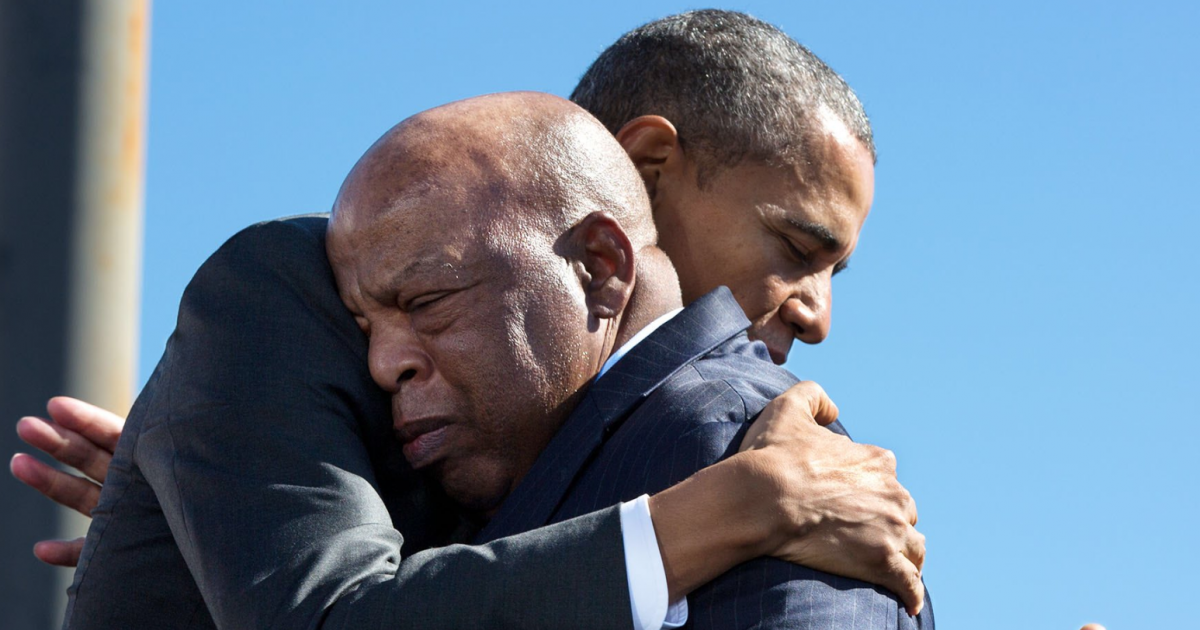Congressman John Lewis, diagnosed with stage 4 pancreatic cancer this past December, turns 80 Friday, and friends, colleagues and supporters are wishing the elder statesman a healthy and happy birthday. His indomitable spirit — which is alive and well as he battles his disease — is legendary.
Read MoreHappy birthday to my friend @repjohnlewis! pic.twitter.com/UjRKlliCog
Stacey Abrams (@staceyabrams) February 21, 2020
President Barack Obama had a special message for the Civil Rights icon:
Happy birthday to one of my heroes someone who believed our right to vote was more important than his own life. Thanks for making good trouble for 80 years, @repjohnlewis. pic.twitter.com/LqMuvmpbLp
Barack Obama (@BarackObama) February 21, 2020
And many of his friends in Congress sent celebratory remarks:
Happy birthday to my friend @RepJohnLewis a true American hero who fights from the heart for justice & opportunity for people across this country. It's an honor to make #goodtrouble with you on your birthday & every day. pic.twitter.com/E8fhI2Lgit
Elizabeth Warren (@SenWarren) February 21, 2020
Lewis is a beloved figure who brings gravitas and moral weight to his role as dean of the Georgia congressional delegation. This is his 17th term in the House.
The son of sharecroppers, Lewis became a nationally recognized leader in the Civil Rights movement. At the age of 23, he was an architect of and a keynote speaker at the historic March on Washington in August 1963. He was also a leader in the 1965 "Bloody Sunday" marches from Selma to Montgomery, Ala., during which police assaulted marchers as they protested the suppression voting rights for African Americans.
Happy birthday @repjohnlewis. From the Nashville lunch counter sit-in of 1960, the freedom rides of 1961, heloing to organize the '63 March on Washington, & bravery on the Edmun Pettis Bridge in #Selma, a lifetime of leadership for justice & #equality. #BlackHistoryMonth pic.twitter.com/SMH4ya13De
Maya Wiley (@mayawiley) February 21, 2020
His many supporters say they are not surprised that he’s showing positivity and strength in the face of his diagnosis. The Atlantic Constitution Journal spoke with some, who say his courage is legendary.
"No one fights harder than John Lewis,” said former Atlanta Mayor Bill Campbell.
On the day he made his cancer diagnosis public, the outlet reports, Xernona Clayton, who has been friends with Lewis since the 1960s, went to see him: "I said you have had challenges. Your faith is strong enough to meet this one. He said he will face this battle with courage."
John Lewis’ Cancer Journey
In a statement when he made his diagnosis public, Lewis said that while he was "clear-eyed about the prognosis, doctors have told me that recent medical advances have made this type of cancer treatable in many cases, that treatment options are no longer as debilitating as they once were, and that I have a fighting chance”
I have been in some kind of fight for freedom, equality, basic human rights for nearly my entire life. I have never faced a fight quite like the one I have now. https://t.co/XVcbTlsNNv
John Lewis (@repjohnlewis) December 30, 2019
Stage 4 Pancreatic Cancer
Unfortunately, late stage diagnoses like Lewis' are relatively common for pancreatic cancer, which means that the disease has often become really difficult to treat by the time it is diagnosed. Screening is a major issues because the disease often doesn't present any symptoms until it has advanced and spread outside of the pancreas.
"Because the pancreas is inside the abdomen, it often doesn't have symptoms that would tell you that something is wrong with your pancreas," Dr. Anirban Maitra, co-leader of Pancreatic Cancer Moon Shot at MD Anderson Cancer Center, told SurvivorNet in a previous interview.
"By the time individuals walk into the clinic with symptoms like jaundice, weight loss, back pain, or diabetes, it's often very late in the stage of the disease. Each year in the United States, about 53,000 patients get pancreatic cancer, and unfortunately, most will die from this disease within a few months to a year or so from the diagnosis."
Dr. Maitra pointed out that a large issue lies in screening methods, which unfortunately, still need to be improved. Testing everyone for the disease, Dr. Maitra said, would lead to too many false positives.
Learn more about SurvivorNet's rigorous medical review process.


